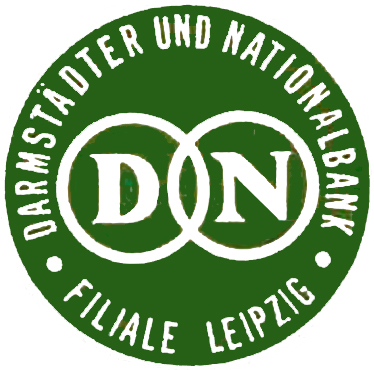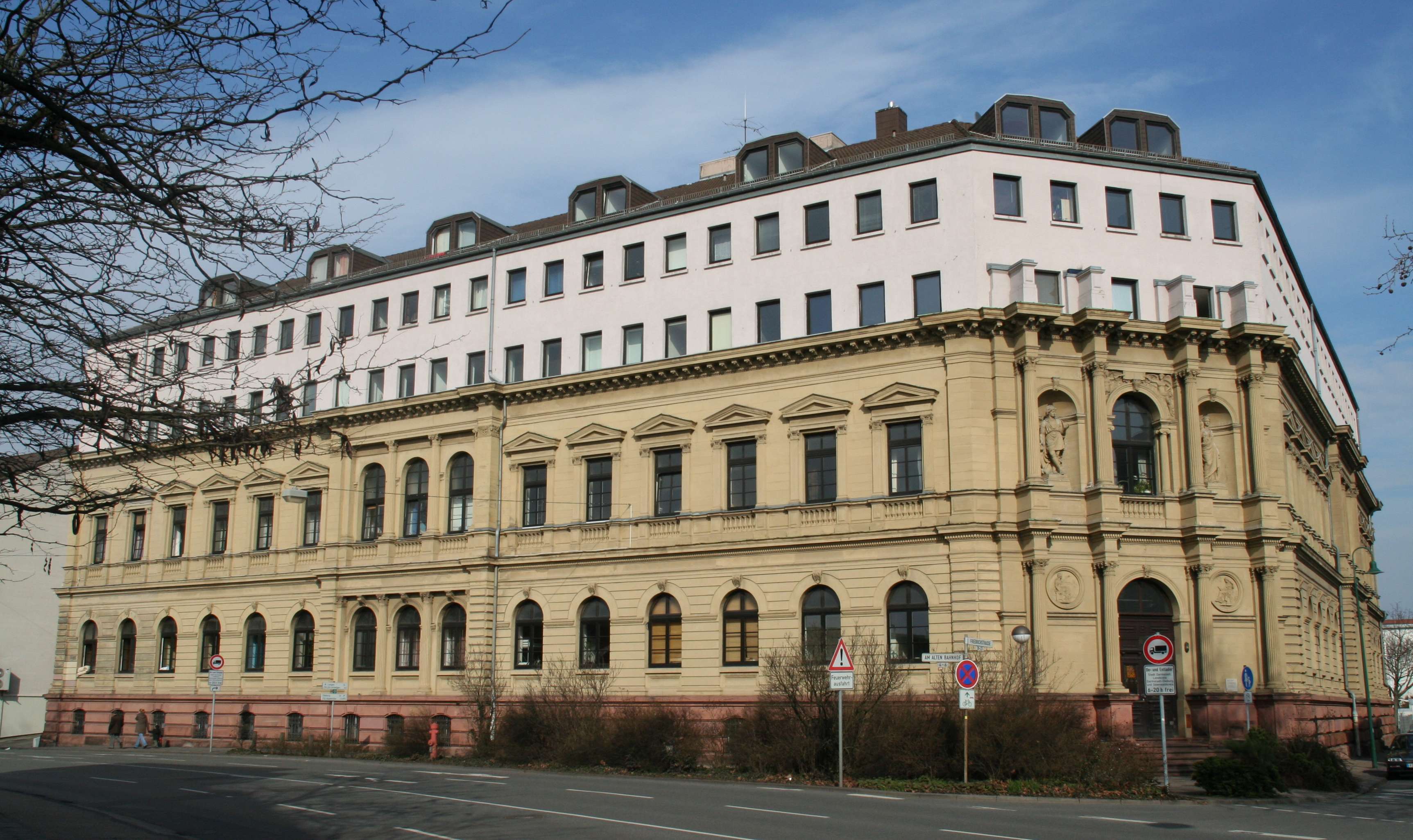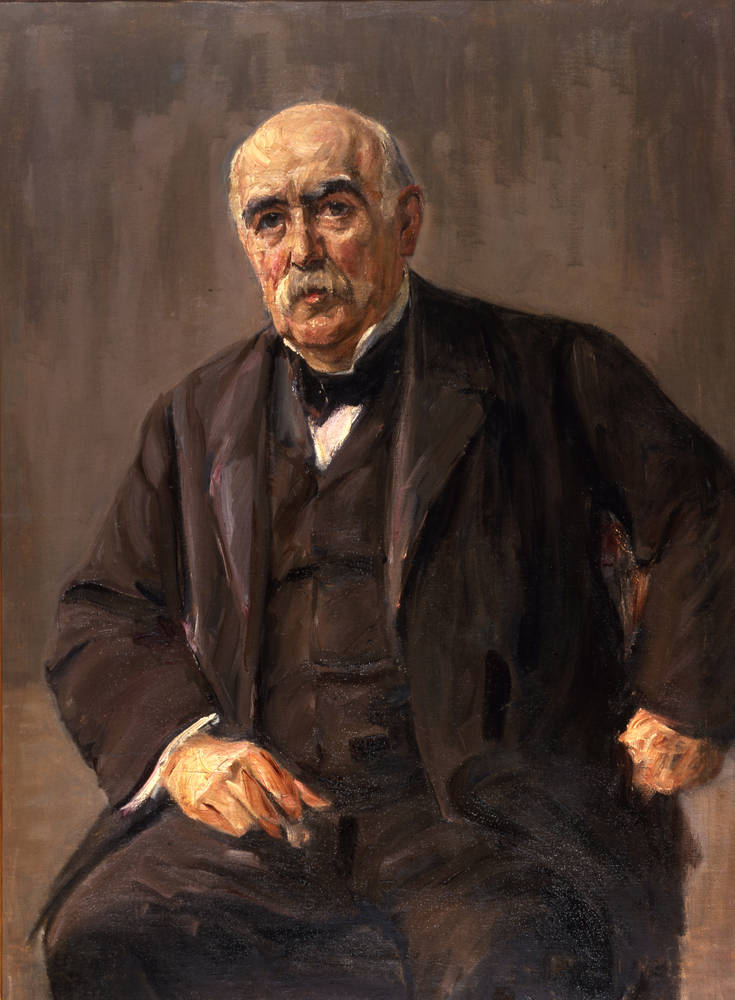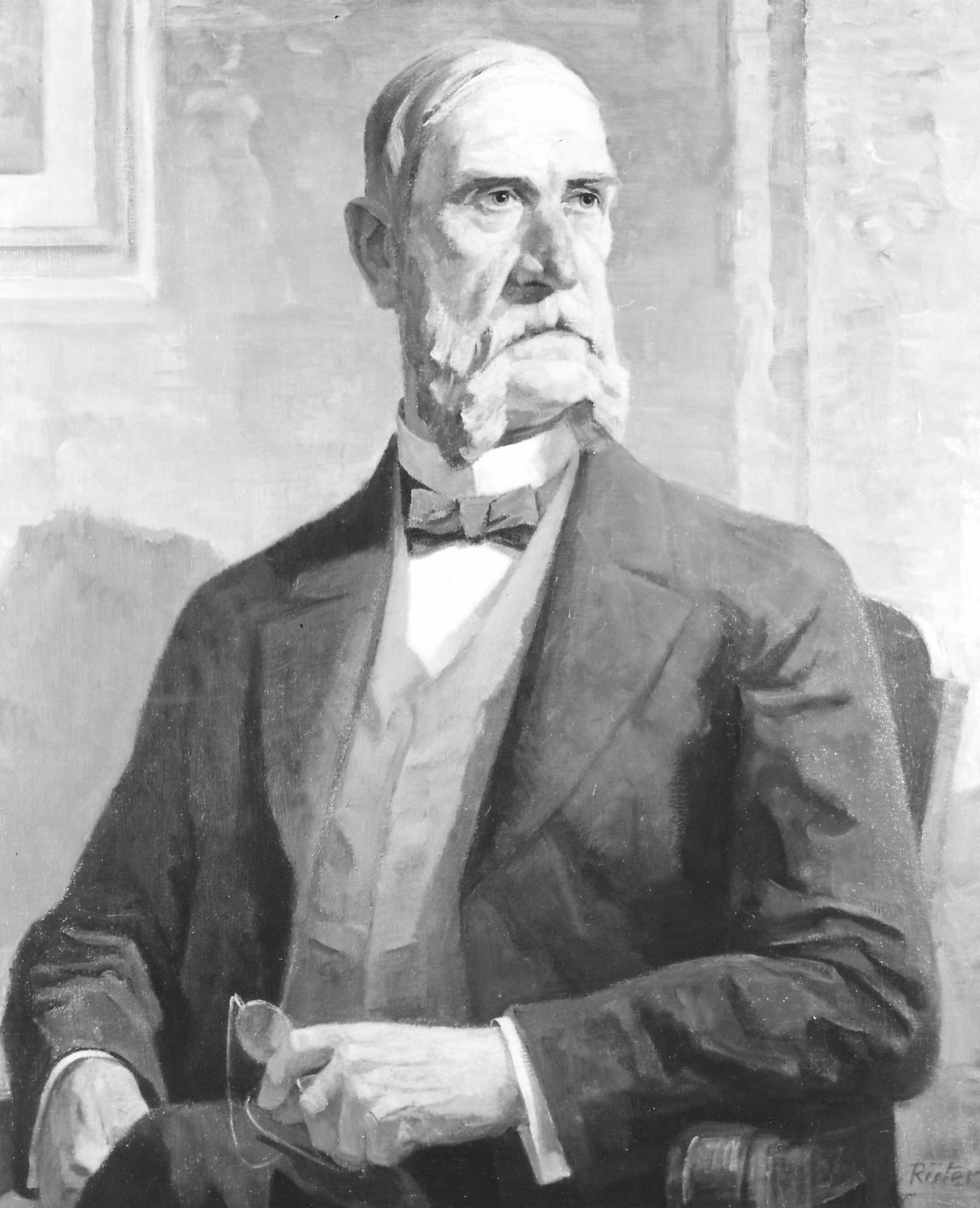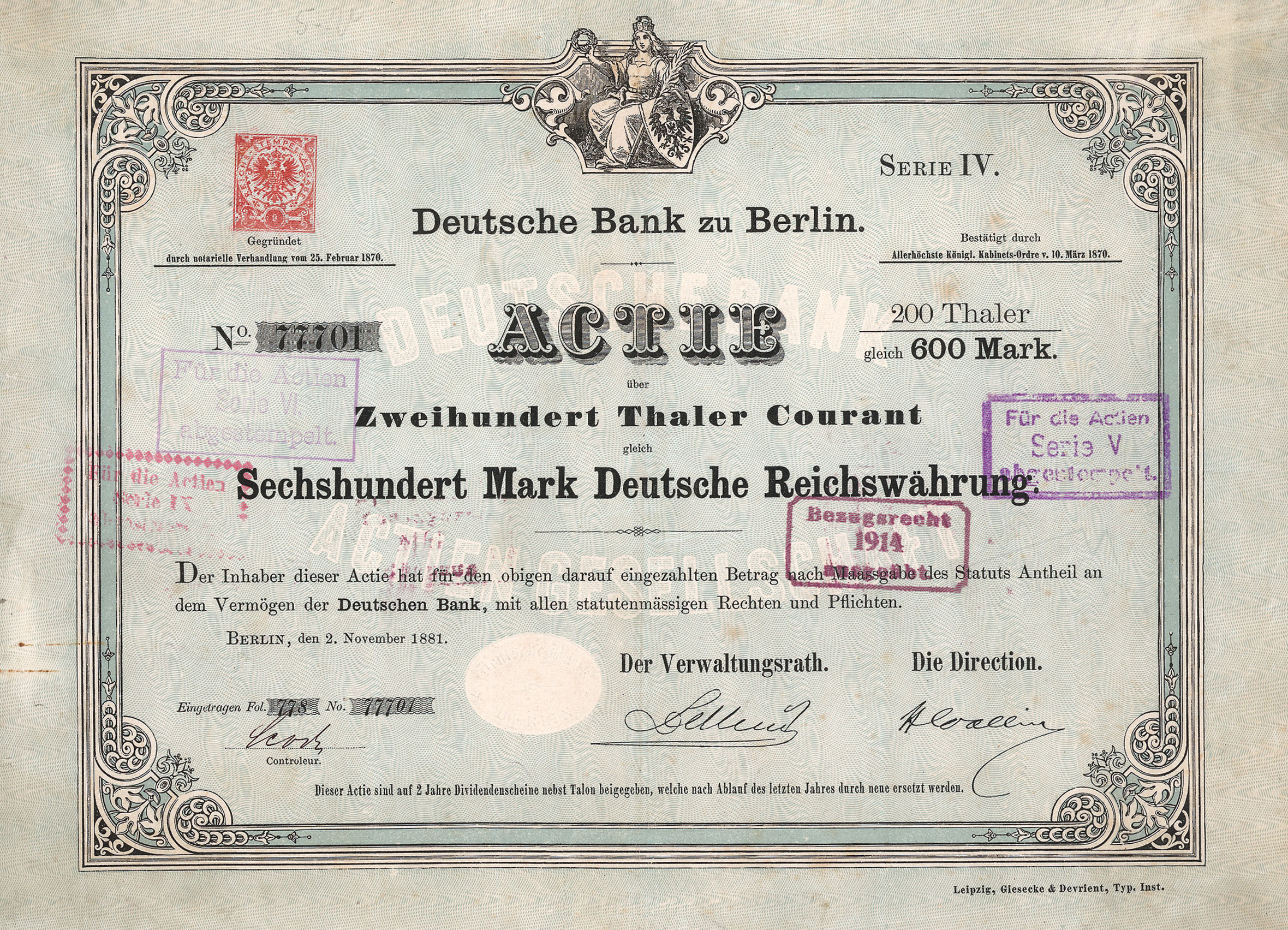|
Danat-Bank
The ''Darmstädter und Nationalbank'', in shorthand Danat-Bank or Danatbank, was a large German joint-stock bank. It was formed in 1922 from the merger of the Bank für Handel und Industrie (Darmstadt), known as Darmstädter Bank, and the Nationalbank für Deutschland. Its failure in July 1931 was a significant episode of the European banking crisis of 1931. Overview In 1920/1921, the ''Darmstädter Bank für Handel und Industrie'' and the ''Nationalbank für Deutschland'' formed the bank union ''Darmstädter-Nationalbank Berlin''. Both banks assumed a joint guarantee of capital and reserves of over 1 billion marks. The merger was fully completed in 1922, resulting in one of the largest commercial banks in Germany. By 1930, Danat-Bank had become Germany's second-largest joint-stock bank, with total deposits of 2.4 billion Reichsmarks ahead of Dresdner Bank (2.3 billion), Commerz- und Privatbank (1.5 billion), Reichs-Kredit-Gesellschaft (619 million), and Berliner Handels-Ge ... [...More Info...] [...Related Items...] OR: [Wikipedia] [Google] [Baidu] |
European Banking Crisis Of 1931
The European banking crisis of 1931 was a major episode of financial instability that peaked with the collapse of several major banks in Austria and Germany, including Creditanstalt on , Landesbank der Rheinprovinz on , and Danat-Bank on . It triggered the exit of Germany from the gold standard on , followed by the UK on , and extensive losses in the U.S. financial system that contributed to the Great Depression. The causes of the crisis included a complex mix of financial, fiscal, macroeconomic, political and international imbalances that have nurtured a lively debate of historiography. Background Germany's banking sector shrank dramatically from 1913 to 1924 but expanded rapidly again in the later 1920s, with fivefold growth of aggregate bank assets between 1924 and 1930. The banks were generally undercapitalized and overstretched following rapid balance sheet expansion in the late 1920s, with a preponderance of short-term debt, much of it foreign. Germany was the world's ... [...More Info...] [...Related Items...] OR: [Wikipedia] [Google] [Baidu] |
Darmstädter Bank
The ''Bank für Handel und Industrie'' in Darmstadt, often referred to as ''Darmstädter Bank'', was a significant joint-stock bank in Germany, active from 1853 until its merger with Nationalbank für Deutschland to form Danat-Bank in 1922. Overview The ''Bank für Handel und Industrie'' was founded by Cologne bankers Wilhelm Ludwig Deichmann, Gustav Mevissen, Abraham Oppenheim and Victor Wendelstadt. It was established with a capital of 25 million guilders and modelled after the French bank Crédit Mobilier, in whose creation in 1852 Oppenheim had been involved and from which it secured backing for the new venture. The Darmstädter Bank received its banking concession on 2 April , and started operations shortly afterwards. It was thus the second universal bank in Germany founded as a joint-stock company (Aktiengesellschaft), after the A. Schaaffhausen'scher Bankverein in 1848. (The Disconto-Gesellschaft had been established in Berlin in 1851, but only became a joint-stock ... [...More Info...] [...Related Items...] OR: [Wikipedia] [Google] [Baidu] |
Dresdner Bank
Dresdner Bank AG () was a German bank, founded in 1872 in Dresden, then headquartered in Berlin from 1884 to 1945 and in Frankfurt from 1963 onwards after a postwar hiatus. Long Germany's second-largest bank behind Deutsche Bank, it was eventually acquired by Commerzbank in May 2009. 1872-1933 The Dresdner Bank was established on through the conversion of , a Dresden-based private bank founded in 1771, on the advice of banker Eugen Gutmann. The bank's founding consortium of investors consisted of (Leipzig), Berliner Handels-Gesellschaft (Berlin), (Frankfurt), (Frankfurt) and (Hamburg), with an initial capital of 8 million Thalers (24 million Marks) and 30 employees in Wilsdruffer Strasse in Dresden. Gutmann became chairman of the new entity's board and led it until his retirement in 1920. In the 1870s, the Dresdner Bank acquired smaller regional institutes and several banks. In 1881, it opened a branch in Berlin, whose activity quickly exceeded the nominal head office in Dr ... [...More Info...] [...Related Items...] OR: [Wikipedia] [Google] [Baidu] |
Berliner Handels-Gesellschaft
The ''Berliner Handels-Gesellschaft'' (BHG, ) was a significant German joint-stock bank, founded in 1856 in Berlin. It relocated to Frankfurt following World War II. On (with retroactive effect at ), BHG merged with Frankfurter Bank to form , referred to as BHF Bank from 1975 to 2017 and since then as ODDO BHF. Overview The foundation of the BHG in 1856 was inspired by the experience of the Crédit Mobilier in France (est. 1852) and its German emulator the Bank für Handel und Industrie in Darmstadt, or (est. 1853). Initially organized by Darmstädter Bank veteran Gustav von Mevissen, Gustav Mevissen, its founding sponsors included S. Bleichröder, , , Mendelssohn & Co., and . It was one of the first five large commercial banks in Germany, following the A. Schaaffhausen'scher Bankverein in Cologne (1848), the Disconto-Gesellschaft in Berlin (1851-1856), the Darmstädter Bank (1853), and the in Meiningen (1856). Like the Disconto-Gesellschaft, and unlike Schaaffhausen and t ... [...More Info...] [...Related Items...] OR: [Wikipedia] [Google] [Baidu] |
Commerz- Und Privatbank
The Commerzbank Aktiengesellschaft (shortly known as Commerzbank AG or Commerzbank ) is a European banking institution headquartered in Frankfurt am Main, Hesse, Germany. It offers services to private and entrepreneurial customers as well as corporate clients. The Commerzbank Group also includes the German brand Comdirect Bank and the Polish subsidiary mBank. As one of the oldest banks in Germany, Commerzbank plays a significant role in the country's economy. It is the largest financier of German foreign trade, with strong ties to the German 'Mittelstand.' In addition, it maintains a presence in all major economic and financial centers worldwide. Since its establishment in 1870, Commerzbank has undergone several changes. It was the first German banking institution to open an operational branch in New York City in 1971. Another milestone was the acquisition of Dresdner Bank in 2009. During the 2008 financial crisis, the Federal Republic of Germany became a major shareholder in th ... [...More Info...] [...Related Items...] OR: [Wikipedia] [Google] [Baidu] |
Reichs-Kredit-Gesellschaft
The ''Reichs-Kredit-Gesellschaft'' (RKG, ) was a significant state-owned German bank, located in Berlin. History The RKG originated in the war economy of Germany during World War I. In 1917, the Reich Treasury established a Statistical Office for War Companies () for the purpose of financing companies that had been set up to support the war effort. to balance the surplus and need for money in the war societies. After the war's end, the corresponding assets and liabilities were transferred to a "credit and control entity" (), a limited-liability company owned by the German government. On , the government-owned VIAG company founded the Reichs-Kredit-Gesellschaft mbH (private limited company) to take over the , and transformed it the next year into a joint-stock company, with as its general manager. The RKG was principally active in the areas of industrial and commercial credit, securities, asset management, and trade finance. By 1930, the RKG had become Germany's fifth-large ... [...More Info...] [...Related Items...] OR: [Wikipedia] [Google] [Baidu] |
Deutsche Bank
Deutsche Bank AG (, ) is a Germany, German multinational Investment banking, investment bank and financial services company headquartered in Frankfurt, Germany, and dual-listed on the Frankfurt Stock Exchange and the New York Stock Exchange. Deutsche Bank was founded in 1870 in Berlin. From 1929 to 1937, following its merger with Disconto-Gesellschaft, it was known as ''Deutsche Bank und Disconto-Gesellschaft'' or DeDi-Bank. Other transformative acquisitions have included those of Mendelssohn & Co. in 1938, Morgan, Grenfell & Company, Morgan Grenfell in 1990, Bankers Trust in 1998, and Deutsche Postbank in 2010. As of 2018, the bank's network spanned 58 countries with a large presence in Europe, the Americas, and Asia. It is a component of the DAX stock market index and is often referred to as the List of banks in Germany, largest German banking institution, with Deutsche Bank holding the majority stake in DWS Group for combined assets of 2.2 trillion euros, rivaling even Spa ... [...More Info...] [...Related Items...] OR: [Wikipedia] [Google] [Baidu] |
Siegmund Bodenheimer , a given name
{{disambig ...
Sigmund or Siegmund may refer to: People * Sigmund (given name), list of people with the name Sigmund Arts and entertainment *'' Sigmund and the Sea Monsters'', American 1970s TV series ;Fictional characters * Sigmund (also Siegmund), a hero in Norse mythology * Siegmund, a focal character in Richard Wagner's ''Die Walküre'' * Sigmund (comics), Doctor Sigmund, a Dutch comics character Others * , a cargo ship in service 1926-29 See also * Sigismund (other) * Zygmunt Zygmunt, Zigmunt, Zigmund and spelling variations thereof are masculine given names and occasionally surnames. It has the same etymology as the Germanic name Zigmund. People so named include: Given name Medieval period * Sigismund I the Old (1467� ... [...More Info...] [...Related Items...] OR: [Wikipedia] [Google] [Baidu] |
Defunct Banks Of Germany
Defunct may refer to: * ''Defunct'' (video game), 2014 * Zombie process or defunct process, in Unix-like operating systems See also * * :Former entities * End-of-life product In Industry (economics), industry, product lifecycle management (PLM) is the process of managing the entire lifecycle of a product from its inception through the Product engineering, engineering, Product design, design, and Manufacturing, ma ... * Obsolescence {{Disambiguation ... [...More Info...] [...Related Items...] OR: [Wikipedia] [Google] [Baidu] |
1931 Disestablishments In Germany
Events January * January 2 – South Dakota native Ernest Lawrence invents the cyclotron, used to accelerate particles to study nuclear physics. * January 4 – German pilot Elly Beinhorn begins her flight to Africa. * January 22 – Sir Isaac Isaacs is sworn in as the first Australian-born Governor-General of Australia. * January 25 – Mohandas Gandhi is again released from imprisonment in India. * January 27 – Pierre Laval forms a government in France. * January 30 – Charlie Chaplin comedy drama film ''City Lights'' receives its public premiere at the Los Angeles Theater with Albert Einstein as guest of honor. Contrary to the current trend in cinema, it is a silent film, but with a score by Chaplin. Critically and commercially successful from the start, it will place consistently in lists of films considered the best of all time. February * February 4 – Soviet leader Joseph Stalin gives a speech calling for rapid industrialization, arguing that only strong indus ... [...More Info...] [...Related Items...] OR: [Wikipedia] [Google] [Baidu] |
Richard Witting
Richard Witting (born: Witkowski; 19 October 1856, Berlin – 22 December 1923, Berlin) was a Prussian politician and financier. Witting studied law at Göttingen, where he became member of Burschenschaft Hannovera (fraternity),:de:Burschenschaft Hannovera Göttingen and later became mayor of Poznań in 1891–1902. From 1902 to 1910 he was director of Nationalbank für Deutschland. Witting was a brother of Maximilian Harden and father-in-law of Hans Paasche. Witting is considered one of the major authors (''fathers'') of the democratic Weimar Constitution, which he and Hugo Preuß worked out in first drafts. He was also a convert to Lutheran Protestantism from Judaism, a common practice of this epoch. References * Witold Jakóbczyk, ''Przetrwać na Wartą 1815-1914'', ''Dzieje narodu i państwa polskiego'', vol. III-55, Krajowa Agencja Wydawnicza, Warszawa 1989 * Joachim Bergmann: Die Schaubühne – Die Weltbühne 1905–1933, Bibliographie und Register mit Annotationen. Saur ... [...More Info...] [...Related Items...] OR: [Wikipedia] [Google] [Baidu] |
Georg Von Simson
{{disambiguation ...
Georg may refer to: * ''Georg'' (film), 1997 *Georg (musical), Estonian musical * Georg (given name) * Georg (surname) * , a Kriegsmarine coastal tanker * Spiders Georg, an Internet meme See also * George (other) George may refer to: Names * George (given name) * George (surname) People * George (singer), American-Canadian singer George Nozuka, known by the mononym George * George Papagheorghe, also known as Jorge / GEØRGE * George, stage name of Gior ... [...More Info...] [...Related Items...] OR: [Wikipedia] [Google] [Baidu] |
